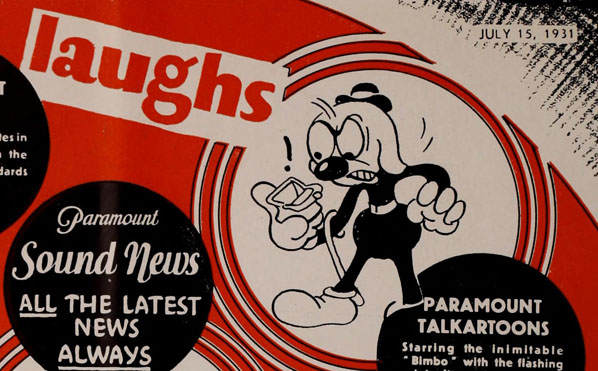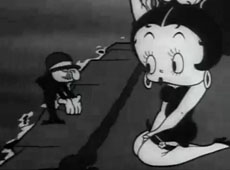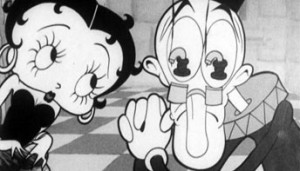
1931 season Paramount shorts trade ad – (thanks to John Vincent)
It was only a matter of time now. The name of Betty Boop, now completely humanized unstead of a mere dog, kept getting larger and larger upon the title cards of the Fleischer cartoons, until there was barely room left to include the subsidiary credits to Bimbo and Koko. Audiences and distributors knew what they wanted – and so did the Fleishers. There was just one alternative left to make more room for Betty’s prominence – lose the series banner “Talkartoons” to clear more room on the screen, and place Betty in her rightful position as the first female star of Toontown. Thus, the Talkartoons would come to wind down by the close of the 1931-32 season, with Max’s only other screen vehicles remaining the bouncing ball Screen Songs. In this instalment, we cover these final episodes, continuing to capitalize in name only upon the novelty of sound – though by this time, the actual product was becoming virtually indistinguishable from the “new” Boop series which would immediately follow.
 Swim or Sink (3/13/32) – A storm at sea sinks an ocean liner, and most of its passengers, leaving Betty, Bimbo and Koko adrift on a raft. A sail is sighted, and the trio hail the passing vessel with a wave of Koko’s underwear as a flag. But as the craft approaches, skull and crossbones insignia on the sails become clearly visible – and our trio prepares for a wacky run in with a lecherous pirate crew. They manage to take much of the chasing in stride, even breaking into song and dance in mid-pursuit, and trick the whole crew into pursuing them over the side into the gaping jaws of a giant fish. The pirates hardly mind at all, carousing and drinking inside the fish’s belly, while the poor fish suffers the worst of belly-aches. Primary song is “The Drunken Sailor”, of which a few recordings were made in medleys of sea shanties. Rober Carr had a version on English Edison Bell Velvet-Face, circa 1912 (embed below). An anonymous version also appeared on a six inch double-sided “Little Marvel” record issued by the Vocalion company circa 1926 in England. John Goss recorded an HMV version including both “The Drunken Sailor” and “Haul Away, Joe” in 1926. Stuart Robertson also recorded “Medley of Sea Shanties, pts. 1 and 2″ for HMV approximately 1934. Leonard Warren, a Metropolitan Opera baritone, recorded an RCA version in thr 1950’s under a medley entitled “A-Rovin”. “Mama, What Can We Do” is Betty’s featured number, and may be an original composition, as I can locate no recordings. “Sailing, Sailing”, “Nancy Lee”, The Prisoner’s Song”, and “Where. Oh, Where Has My Little Dog Gone” also make appearances.
Swim or Sink (3/13/32) – A storm at sea sinks an ocean liner, and most of its passengers, leaving Betty, Bimbo and Koko adrift on a raft. A sail is sighted, and the trio hail the passing vessel with a wave of Koko’s underwear as a flag. But as the craft approaches, skull and crossbones insignia on the sails become clearly visible – and our trio prepares for a wacky run in with a lecherous pirate crew. They manage to take much of the chasing in stride, even breaking into song and dance in mid-pursuit, and trick the whole crew into pursuing them over the side into the gaping jaws of a giant fish. The pirates hardly mind at all, carousing and drinking inside the fish’s belly, while the poor fish suffers the worst of belly-aches. Primary song is “The Drunken Sailor”, of which a few recordings were made in medleys of sea shanties. Rober Carr had a version on English Edison Bell Velvet-Face, circa 1912 (embed below). An anonymous version also appeared on a six inch double-sided “Little Marvel” record issued by the Vocalion company circa 1926 in England. John Goss recorded an HMV version including both “The Drunken Sailor” and “Haul Away, Joe” in 1926. Stuart Robertson also recorded “Medley of Sea Shanties, pts. 1 and 2″ for HMV approximately 1934. Leonard Warren, a Metropolitan Opera baritone, recorded an RCA version in thr 1950’s under a medley entitled “A-Rovin”. “Mama, What Can We Do” is Betty’s featured number, and may be an original composition, as I can locate no recordings. “Sailing, Sailing”, “Nancy Lee”, The Prisoner’s Song”, and “Where. Oh, Where Has My Little Dog Gone” also make appearances.
Crazy Town (3/26/32) – A surreal venture into a world where nothing makes sense. Sound familiar? Trolleys disappear into a hole in the ground. Trains are met by travelling stations rather than the other way around. Beauty shops offer swaps of heads, while barbers restore hair with every snip of their scissors. You get the idea, Songs: “Foolish Facts”, recorded in this country by Frank Crumit on Victor, but more popular in England in a version by The Radio Rhythm Five with vocal by Al Bowlly on Edison Bell Winner (embed below). “Rain on The Roof”, an early 1932 song written by Ann Ronell (who would also compose “Who’s Afraid of the Big Bad Wolf?”), was recorded by Nat Shilkret and the Victor Orchestra for Victor, the Casa Loma Orchestra for Brinswick, Ed Loyd for Melotone, and in British versions by Ambrose on HMV, and by the Savoy Hotel Orpheans on Columbia. “Dance of the Little Dutch Dolls” was recorded by Paul Whiteman on Victor. “Horses” makes a reappearance. An early appearance of “Ain’t She Sweet?” is also included (of which I will defer discussion until we reach the Screen Song of the same title). The film ends with a brief quote to “Who’s Your Little Who-Zis?”, recorded by the Arden=Ohman Orchestra for Victor with Sylvia Froos vocal, Ben Selvin’s Knickerbockers for Columbia, Jerry Fenwyck and his Orchestra on Clarion et al., and in England by Jack Hylton on Decca and Jay Wilbur on Summit. The song received nostalgic revivals by Benny Strong on Capitol and by Dean Martin, also on Capitol (who performed the piece as a corny comedy vaudeville act with Jerry Lewis in one of their pictures).
The Dancing Fool (4/6/32) – Bimbo and Koko are window washers, finding gag material in pulling themselves up the side of a tall building on a scaffold. Koko ginds himself hanging onto a ledge by his fingernails, and is rescued by Bimbo’s use of a well-placed needle into Koko’s posterior. All of their ups and downs appear to have been entirely unnecessary, as they arrive at their intended destination on ground level, where Bimbo paints the name of Betty Boop’s Dancing School on a window pane with paint from his tail. Betty appears, and the two smitten saps enter to observe her dancing techniques and a classroom instruction filled with birds who spend most of their time intertwining their long legs in precision steps one over the other. Songs: “Dancing to Save Your Sole”, a number from “Paramount on Parade” introduced by Nancy Carroll, which received at least one commercial recording by Gus Arnheim on Victor, with a vocal trio and real tap dancing (embed below). “It’s A Great Life” and “I’ve Got a Feeling I’m Falling” make reappearances. “Don’t Send My Boy To Prison”, a song from 1930, was recorded by an Ed Kirkeby group for Perfect et al., and for Columbia by Harry Reser’s Six Jumping Jacks. “March of the Grenadiers”, from “The Love Parade”, was introduced by Jeanette MacDonald and recorded by her on Victor. “Hello, Baby” was recorded by Waring’s Pennsylvanians on Victor, Bert Lown on Hit of the Week, Hal Kemp on Brunswick, and in a vocal version by Cotton and Morpheus (a blackface duo) on Brunswick. The dance number, ?Mama Inez”, seems to date in its earliest recording in Spanish to Nita de Grandy on Victor, issued in a series devoted to Spanish language recording in 1928. The most famous version was by the Havana Novelty Orchestra (Nat Shilhret) on Victor, which treated the tune as a novelty, with the addition of corny trumpet and maniacal laughter (used as a eedle drop soundtrack a few years later for Ub Iwerks’ Flip the Frog cartoon, “Soda Squirt”.). These elements were lifted for cover versions bu other labels, including Enric Madriguera (actually Ben Selvin) on Columbia, and by “Don Carlos and his Rhumba Band” (likely a Justin Ring group with Bob Effros on trumpet) on Perfect, which is the needle drop used In the film. Straighter versions were issued by Vincent Lopez on Brunswick, and in a vocal version by Maurice Chevalier on Victor. A British version appeared by The Blue Jays on Edison Bell Radio 8-inch, Xavier Cugat also performed a later version on Columbia. Ben Light performed it during the 1950’s for Tempo with a small combo. Charlie Parker would perform it as an album cut on Verve, and Frank Pourcel on Odeon.
 Chess-Nuts (4/16/32) – Something of a sequel to “Mask-a-Raid”, featuring the same menage-a-trois of Betty, Bimbo, and the Black King, all cast as warring pieces on a chess board. Some live action footage of two geezers playing the game provides a wraparound, and we quivkly suspect it will be a long time between moves. One definite pre-code gag has the black king asking Betty if she can see the lovelight in his eyes (depicted as two candles in his eyeballs). Betty blows the candles out, and they go limp. Another such gag has Betty physically carried into a bedroom by the king – but the bed wants nothing to do with what the king has in mind, and exits under its own power. The king is finally defeated, and Betty and Bimbo march off happily with their troops, while the two old geezers have still not moved, allowing their beards to intertwine inti a commingled nest. Songs: “Funeral March” by Chopin. The original “Don’t Take My Boop Boop a Doop Away” reappears. Another original entitled “I’m the King” is sung by Bimbo and the Black King. “Parade of the Wooden Soldiers” (which we will meet in more formal fashion in a Betty Boop episode of the same name later in the series) was written by Leon Jessel, and became popular in 1922, recorded for Victor by Paul Whiteman (first acoustically, then electrically), Nathan Glantz for Perfect/Pathe, Nat Shilkret (as the International Novelty Orchestra) for Victor (which recording served as partial soundtrack for Ub Iwerks’ “Balloonland”), and a version in the 1950’s by Arthur Fiedler and the Boston Pops on Victor (remade in stereo on the Album, “Pops’ Christmas Party”). The Crystals brought the tune into the rock and roll era on the album, “A Christmas Gift for You” on Philles And countless children’s versions.
Chess-Nuts (4/16/32) – Something of a sequel to “Mask-a-Raid”, featuring the same menage-a-trois of Betty, Bimbo, and the Black King, all cast as warring pieces on a chess board. Some live action footage of two geezers playing the game provides a wraparound, and we quivkly suspect it will be a long time between moves. One definite pre-code gag has the black king asking Betty if she can see the lovelight in his eyes (depicted as two candles in his eyeballs). Betty blows the candles out, and they go limp. Another such gag has Betty physically carried into a bedroom by the king – but the bed wants nothing to do with what the king has in mind, and exits under its own power. The king is finally defeated, and Betty and Bimbo march off happily with their troops, while the two old geezers have still not moved, allowing their beards to intertwine inti a commingled nest. Songs: “Funeral March” by Chopin. The original “Don’t Take My Boop Boop a Doop Away” reappears. Another original entitled “I’m the King” is sung by Bimbo and the Black King. “Parade of the Wooden Soldiers” (which we will meet in more formal fashion in a Betty Boop episode of the same name later in the series) was written by Leon Jessel, and became popular in 1922, recorded for Victor by Paul Whiteman (first acoustically, then electrically), Nathan Glantz for Perfect/Pathe, Nat Shilkret (as the International Novelty Orchestra) for Victor (which recording served as partial soundtrack for Ub Iwerks’ “Balloonland”), and a version in the 1950’s by Arthur Fiedler and the Boston Pops on Victor (remade in stereo on the Album, “Pops’ Christmas Party”). The Crystals brought the tune into the rock and roll era on the album, “A Christmas Gift for You” on Philles And countless children’s versions.
A-Hunting We Will Go (5/8/32) – Bimbo and Koko get the notion that Betty wants a fur coat, and each goes out hunting for the makings. After several misadventures, they return with a full variety of coats from all manner of species, only to get remonstrated by Betty for depriving the shivering former owners of the pelts. Betty is especially concerned about the bears, reduced to their “bare” skins. A gag which may have been a bit in poor taste has activities at a “Leopard Colony” (play on leper colony), where a cat with no spots is accepted only after being peppered with shot from one of the hunting guns. Songs: the well-kowm title tune, which we’ve visited before. “Then I’ll Be Happy”, a 1925 pop, recorded in a dance version by Russo and Fio Rito’s Oriole Orchestra on Victor (Dan Russo and Ted Fio Rito would split to organize their own bands in later years), the California Ramblers on Columbia, the University Six on Harmony (actually the Ramblers again by false name), Fletcher Henderson for Banner et al., Nick Lucas as a vocal for Brunswick, Josephine Baker for French Odeon in 1926, and a revival in 1955 by Eddie Fisher on RCA Victor. “Ho-Him”, reappears again. “Why Did You Kiss That Girl” (with new lyric, “Why Did You Scare Those Bears?”), is also used – a 1924 song recorded by Paul Whiteman for Victor with vocal by Billy Murray’s American Quartet, Bennie Krueger on Brunswick, the Varsity Eight for Cameo, and Ella Shields in England (I am not sure of the label). Revived by Ken Griffin on the Broadcast label in the late 1940’s. The tune seems to borrow a Germanic riff for its opening line, which is nearly identical to a recurring riff in the opening titles music cue of the “Captain and the Kids” series produced for MGM.
Hide and Seek (5/14/32) – Another Talkartoon giving every indication of being held back on the release calendar from an earlier season, featuring the same proto-Bimbo fron “Step On It” and “The Robot” – now not even billed as Bimbo because no one buy now would recognize him. The plot is a chase between Bimbo and “I. Grabber, Kidnappers (address at 66 Snake Street, per his business card. His objective is the same anonymous girl used in “The Robot” The chase leads to a volcano, whose insides resemble the depths of Hades. A devil makes short work of Grabber as filling for a pie. Bimbo makes a motorcycle escape through the center of the Earth, coming out upside down in China. A Chinese justice of the peace marries Bimbo and his girl, who respond to the “Do you take…” lines in the local native tongue: “Chow Mein”, and “Chop Suey.” “Pizzicato Mysterioso” appears for it’s usual mysterious purpose. The “Jolly Robbers Overture” by Von Suppe is heard as chase riff, recordings dating back to at least 1906 by the Columbia Band, and also recorded by the Pathe Militay Band and by Hager’s Orchestra on Zonophone. It would be frequently heard in later Warner cartoons, including in the chain-reaction rivet sequence in “Homeless Hare”. “Ain’t she Sweet” appears again. “I’d Climb the Highest Mountain” is quoted for the race on the volcano. Also a return for “There’ll be a Hot Time In the Old Town Tonight”.
Admission Free (6/12/32) – Betty is the change girl at a penny arcade, giving people pennies for their nickels and dimes. One politically incorrect gag has Indian head pennies doing a war dance. Most of the people in the arcade are watching the hand crank “movies” – we don’t get to see the films, but the music accompanying one, “Streets of Cairo”, gets Betty dancing in matching fashion. Koko tries a swinging punching bag, getting knocked in the puss by it. Bimbo troes the shooting gallery, not having much luck in targeting the mechanical bunnies, one of which escapes by jumping out a window. This cause the cartoon to shift gears (with a possible grind) to an outdoor hunting sequence, with the arcade virtually forgotten. Somehow, Bimbo and Betty wind up riding on a skyrocket, with Bimbo declaring that nothing will ever separate them – until a passing comet does just that. Songs: “The Bowery”, from about 1882, not generally recorded except for nostalgic medleys. “Shine”, a 1924 song written by black composers Mack, Brown, and Dabney, recorded in an evergreen version as the second paoring of Bing Crosby and the Mills Brothers on Brunswick, and in other versions by Jesse Stafford in 1928 for Brunswick. Film versions included a Soundie by the Three Suns, and a notable interpolation of the number into “Cabin in the Sky” performed by John W. Bubbles) of Buck and Bubbles). “Oh, You Beautiful Doll” and “Sidewalks of New York” also reappear.
The Betty Boop, Limited (7/15/32) – Betty and her vaudeville troupe are heading to their next destination, and decide to rehearse aboard the train. A running gag has one little mouse insisting on singing “Silver Threads Among the Gold”, while the rest of the group wishes he would cease and desist. The train keeps encountering a recalcitrant cow standing across the tracks. After some surreal rerouting of the train’s direction by creative lever pulling of a traffic control manager, the train eventually hits the cow, transforming it into a row of milk bottles. Musical cues include “When the Midnight Coo Choo Leaves for Alabam’” (previously discussed in the Song Car-Tune days).’ “Beyond the Blue Horizon” was from Ernst Lubitsch’s “Monte Carlo” starring Jeanette MacDonald. Jeanette introduced the number in her unique singing style, and recorded it for Victor. George Olsen and his Music did a dance version for Victor, and Phil Spitalny for Brunswick. In England, Van Phillips performed it for Columbia, and Jack Hylton on HMV. “Baby’s Birthday Party” once again appears. “Silver Threads Among the Gold” was recorded about 1903 by Richard Jose for Monarch, in 1914 by Elsie Baker on Victor, by John McCormack on Red Seal Victor in the teens and remade electrically for HMV in the 1920’s, and by Henry Burr in early versions for American and Columbia, and later a Victor version in 1923. (Oddly, the 1923 version was reissued in 1933 on Victor’s “Montgomery Ward” label as if an electrical recording, though it was still the same acoustic version.) Bing Crosby would eventually issue a version around 1947 for Decca. Jo Stafford, Slim Whitman, and Billy Vaughn would provide revivals for their respective labels as album cuts in the LP era.
Next: Screen Songs 1932 – more of your favorite radio stars.


 James Parten has overcome a congenital visual disability to be acknowledged as an expert on the early history of recorded sound. He has a Broadcasting Certificate (Radio Option) from Los Angeles Valley College, class of 1999. He has also been a fan of animated cartoons since childhood.
James Parten has overcome a congenital visual disability to be acknowledged as an expert on the early history of recorded sound. He has a Broadcasting Certificate (Radio Option) from Los Angeles Valley College, class of 1999. He has also been a fan of animated cartoons since childhood.












































Leonard Warren, the baritone who recorded a medley of sea chanties that included “Drunken Sailor”, had an illustrious career as an opera singer. But he’s probably best remembered today for dropping dead on stage at the Metropolitan Opera in 1960 while playing Don Carlo in Verdi’s “La Forza del Destino”, just after singing the aria “Morir, tremenda cosa” (“To die, a momentous thing”). This and other unfortunate incidents have given “La Forza” a reputation as a cursed opera. The notoriously superstitious Luciano Pavarotti refused to perform it for that reason.
“A Hunting We Will Go” was written by the 18th-century English opera composer Thomas Arne, whose other claim to fame is “Rule, Britannia!”
“The Betty Boop Limited” not only uses Irving Berlin’s “When the Midnight Choo Choo Leaves for Alabam'”, but also Al Jolson’s hit “Alabamy Bound”. Just in case there’s any doubt as to the train’s ultimate destination.
The hand-cranked movie peepshows in “Admission Free” are called mutoscopes. I got to try out a couple of them at the Henry Ford Museum years ago. It’s too bad we don’t get to see the movies, as some of them have rather racy titles like “She Forgot to Pull the Shade” and “What the Bellboy Saw”. But here’s a puzzle: one of the mutoscopes is showing a movie called “Oh You Queenie Oh Oh Oh”, but when the black king is tying Betty up in “Chess-Nuts”, she exclaims “Oh you kingie, hello kingie!” I suspect there’s a connection, but what is it? A song? A slang expression? A dirty joke? Maybe it’s expecting too much to try to make rhyme and reason out of a cartoon with dialogue like “Huffa jump, stuffa jump, hicky dicky juffa jump!” and “Ocky woo, ocky wa, ocky wocky check!”
Sadly, both Al Bowlly and Leon Jessel died at the hands of the Nazis: Bowlly by a bomb, and Jessel after being tortured.
In “The Betty Boop Limited”, Koko dances to a famous tune called “Nola” by Felix Arndt. Arndt was on his way to becoming one of the most popular songwriters of his day when he died in the flu pandemic of 1918 at the age of 29.